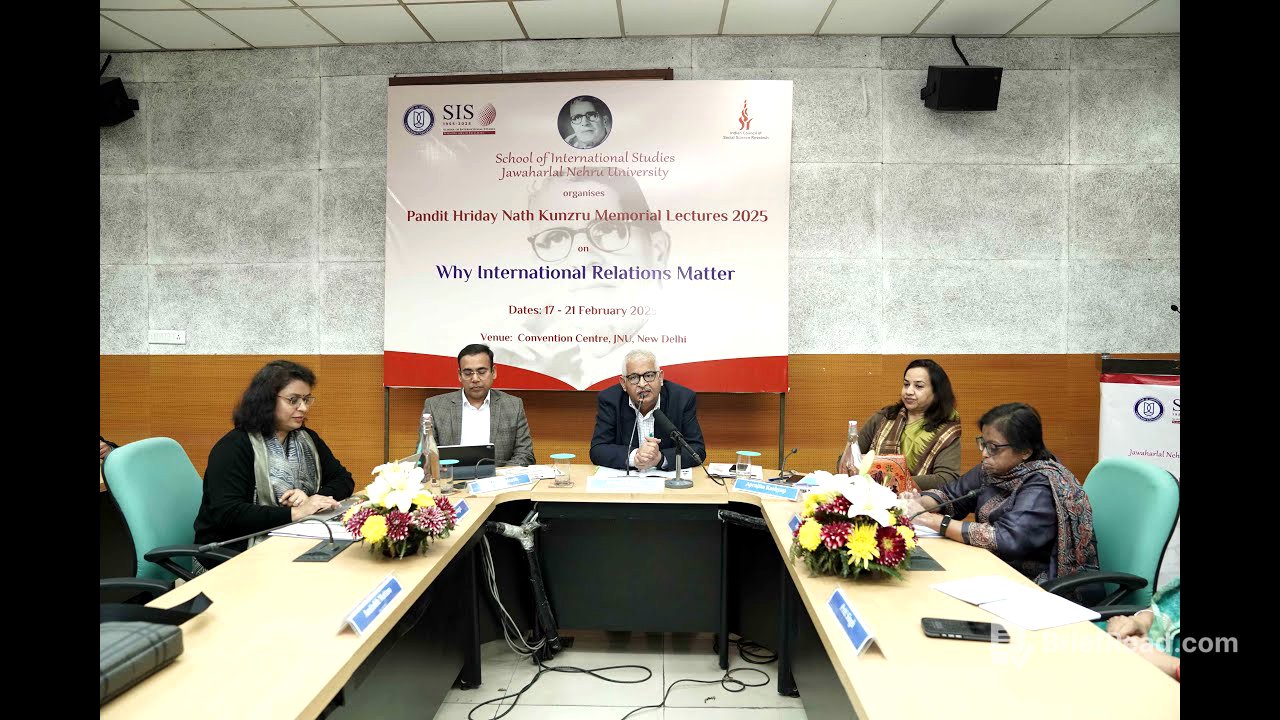TLDR;
This YouTube video features a panel discussion titled "Why the Americas Matter," focusing on the geopolitical and economic significance of the United States, Latin America, and Canada in the contemporary world. The discussion covers topics such as the strength of the US economy and military, Latin America's contributions to international relations theory, Canada's role in global diplomacy and environmental sustainability, and the impact of US foreign policy on West Asia, particularly concerning the Palestinian people.
- The US remains a dominant economic and military power, though its global leadership is being challenged.
- Latin America offers unique perspectives on international relations, particularly from the periphery.
- Canada plays a significant role in global trade, diplomacy, and environmental sustainability.
- US foreign policy in West Asia has profound impacts on regional conflicts and the lives of ordinary people.
Introduction [0:11]
Professor Arind Kumar introduces the session, highlighting its importance in the context of contemporary international relations. He acknowledges the contributions of the US to the field of international relations and introduces the panellists: Dr. Vinit, Dr. P Kasap, Dr. SN Vhat, and Dr. Sima bedya. Each speaker will present their views on why the Americas matter, followed by a Q&A session.
Why the US Matters [4:33]
Dr. Vinit discusses the question of whether US power is in decline, considering factors such as the rise of China and global power realignments. He divides his presentation into three parts: the economy, security, and soft power. Despite talks of decline, the US economy remains the strongest globally, with a GDP close to $30 trillion. While China has caught up in absolute numbers, the US still leads in per capita GDP. The strength of the dollar reflects the strength of the US economy, driven by technology and high-end services. In terms of military strength, the US leads in spending, allocating approximately $900 billion compared to China's $260 billion. The US also holds a clear advantage in soft power, with its culture and education system remaining highly popular worldwide. However, the US faces challenges in addressing global issues like climate change, and Trump's policies may erode American power.
Why Latin America Matters [17:15]
Dr. P Kasap explores why Latin America matters in international relations, noting that mainstream IR has often overlooked the theoretical contributions of Latin American scholars. She argues that Latin American approaches to world politics help understand how peripheral states navigate power transitions and ascend to less peripheral positions. Latin America has contributed theories such as international insertion, inclusion autonomy, the South-South vision, multilateralism of reciprocity principle, pragmatism and peripheral realism. She cites thinkers like ELO kuag rbe, Carlos pu, and eraldo Munos, who have shaped foreign policies based on autonomy, development, and the importance of the US in the region. Despite not leading in economic or military terms, Latin America has contributed to international political economy with theories like the EAC prish Center periphery Paradigm and the Dependency Theory. She also highlights the success stories of Latin American countries in resisting financial crises and maintaining democracy, while acknowledging the limits to their reach due to US influence, hyper-presidentialism, and economic constraints.
Why Canada Matters [28:09]
Dr. SN vhat discusses Canada's significance in the global landscape, focusing on its economic and trade influence, diplomatic and security role, environmental sustainability efforts, and cultural and social leadership. Canada is the 10th largest economy in the world, a global powerhouse in trade and finance, and has the third-largest proven oil reserves. It is a key player in international trade agreements like the United States Mexico Canada agreement and the comprehensive Pro and Progressive agreement for trans-pacific partnership. Canada is recognised for its diplomatic strength, peacekeeping efforts, and contributions to global security through NATO and the five eyes intelligence Network. It is also a leader in environmental sustainability, aiming for Net Zero carbon emissions by 2050 and generating a significant portion of its electricity from hydrop power. Canada is celebrated as a model of multiculturalism and inclusion, making it a leader in cultural diplomacy. However, Canada faces challenges in navigating global uncertainty, including foreign interference and pressure from the US.
Why People Matter in West Asia: A Focus on Palestine [41:05]
Dr. Sima bedya discusses the importance of people in West Asia, focusing on the Palestinian people and the impact of the Gaza War. She quotes journalist muham Mavish on the pervasive nature of the conflict in Gaza and references AEL wisman's work on the cartography of occupation. She connects the situation in Palestine to US interests in West Asia, describing it as an informal Empire Building through economic, political, and security control. While energy is a key consideration, the US has been reducing its vulnerability on vation energy. She highlights the democratic deficit in West Asia and criticises the US for not doing more to stop the Gaza War, despite providing significant arms Supply to Israel. She expresses concern over Trump's proposal for gazans to leave their homeland, questioning the international community's ability to prevent such actions.
Q&A Session [52:50]
The session concludes with a Q&A session, where students raise questions about US hegemony, China's influence in Latin America, Canada's global aspirations, and the US-Israel Nexus. Dr. Vinit responds to questions about Trump's agenda, emphasising that his actions are aimed at his constituents and that China is seen as a challenger to US interests. Professor Kumar adds that Trump's focus is on the Panama Canal rather than annexing Panama, and that the US cannot remain isolated from global affairs. Dr. SN vhat explains that Canada promotes its values through a middle power approach. Dr. Sima bedya connects Trump's actions to oligarchy capitalism and highlights the need to understand the economic drivers behind US foreign policy.









